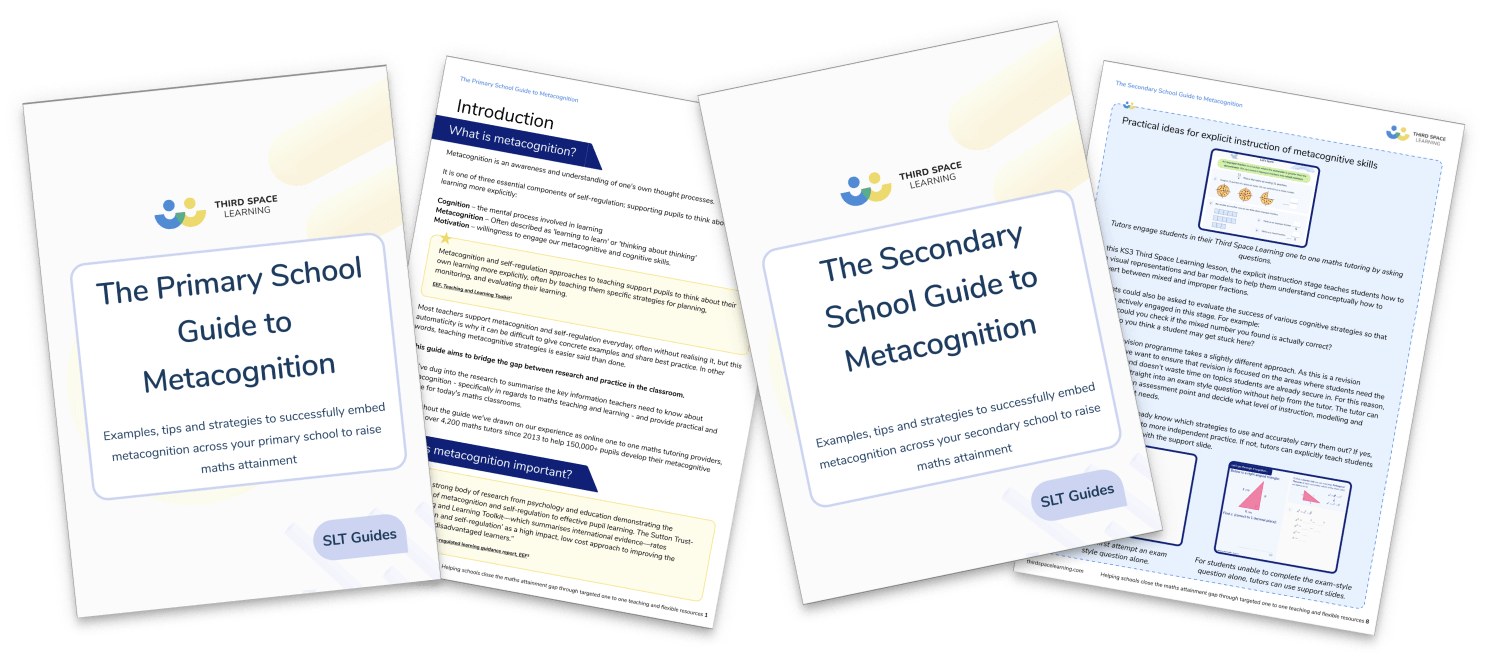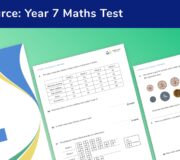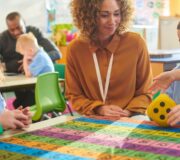Metacognition In The Classroom: A 7-Step Practical Approach To Maths Teaching
Metacognition in the classroom is a key tenet of successful learning, according to a report by the EEF. Here’s what some of these metacognitive strategies look like in practice in schools, presented as a 7-step model.
- 1. SKILLS: Teachers should acquire the professional understanding and skills to develop their pupils’ metacognitive skills
- 2. MONITOR: Explicitly teach pupils metacognitive strategies, including how to plan, monitor, and evaluate their learning
- 3. MODEL: Model your own thinking to help pupils develop their metacognitive and cognitive processes
- 4. CHALLENGE: Set an appropriate level of challenge to develop pupils’ self-regulation and metacognition
- 5. TALK: Promote and develop metacognitive talk
- 6. ORGANISE: Explicitly teach pupils how to organise and effectively manage their learning independently
- 7. SUPPORT: Schools should support teachers to develop their knowledge of these approaches and expect them to be applied appropriately
- How do we know if our metacognitive strategies in maths are working?
- Never too early to start teaching metacognition
The power of metacognition is something we have hard wired into the Third Space Learning methodology for our online one to one maths interventions. Metacognitive strategies used by tutors help us to ensure pupils make excellent progress in maths.
The Ultimate Guide to Metacognition
A guide on everything you need to know to successfully embed metacognition across your primary or secondary school.
Download Free Now!Here, we explain exactly what we do in our online tutoring programme to provide you with practical examples of the steps you can take as a school leader and classroom teacher.
To get the first question out of the way: why should you care?
As the Education Endowment Foundation report says:
‘There is a strong body of research from psychology and education demonstrating the importance of metacognition and self-regulation to effective pupil learning. The Sutton Trust-EEF Teaching and Learning Toolkit—which summarises international evidence—rates ‘metacognition and self-regulation’ as a high impact, low cost approach to improving the attainment of disadvantaged learners. [1]‘
Broadly speaking – it works. Together with cognition and motivation, metacognition is key to being a self-regulated and independent learner, who is actively engaged in their own learning experiences.
In this blog, we’ve brought in our insights from providing online one to one tutoring to over 5,000 primary and secondary pupils every week. We’ve seen firsthand the impact metacognitive practices have had on student learning and we’re keen to share this with other educators.So, here are the 7 steps from the report and guidance to show you how to implement these metacognitive skills in your primary or secondary schools.
1. SKILLS: Teachers should acquire the professional understanding and skills to develop their pupils’ metacognitive skills
Over a period of initial and continuous professional development, Third Space Learning’s one to one maths specialist tutors receive explicit training on the tenets of student success, for both primary pupils and secondary school students.
We believe enjoyment and fluent dialogue is key to motivation, which we’ve referred to as ‘Emotions’ below. That’s why we put a huge focus on rapport and relationship building in our training and programme.

Understand the metacognitive stages for a learner on any task
The first stage for you and your team’s development is knowing about the mental processes that a learner goes through.
Here’s what the EEF metacognition report says:
‘We approach any learning task or opportunity with some metacognitive knowledge about:
- our own abilities and attitudes (knowledge of ourselves as a learner);
- what strategies are effective and available (knowledge of strategies); and
- this particular type of activity (knowledge of the task).
When undertaking a learning task, we start with this knowledge, then apply and adapt it. This is metacognitive regulation. It is about planning how to undertake a task, working on it while monitoring the strategy to check progress, then evaluating the overall success.’
This diagram represents the metacognitive regulation cycle as applied to a maths problem:
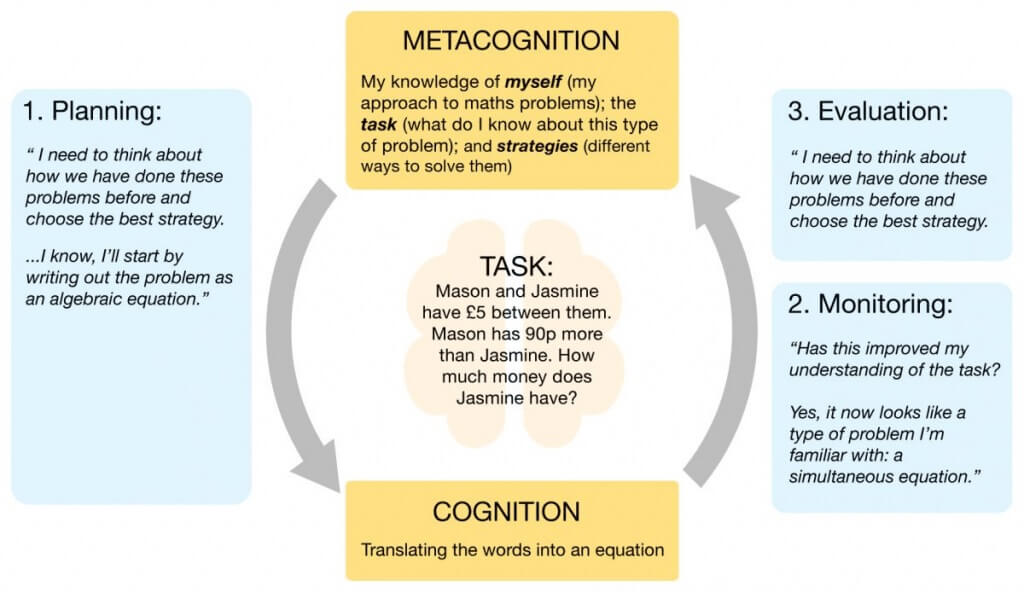
Once you understand that ‘self-regulated learners are aware of their strengths and weaknesses and can […] improve their learning’ you will be closer to supporting them to develop their learning behaviours and processes.
2. MONITOR: Explicitly teach pupils metacognitive strategies, including how to plan, monitor, and evaluate their learning
During the opening of our one to one lessons, tutors are directed to focus on metacognitive knowledge.
They’re trained to ask questions around the pupils’ attitudes and ability in the topic at hand before they’ve even started on the maths.
From our practice, we’ve found questions like: ‘How do you feel about this topic?’ or ‘How confident are you in solving these types of questions?’ to be a simple but effective starting point,
Example questions you can use to start the metacognitive process in the classroom
Tutors investigate what the pupil already knows about the topic and what strategies they are aware of for solving this type of activity, using questioning in the classroom techniques, such as:
- ‘What strategies do you use when problem solving?’
- ‘What do you notice?’
- ‘What things should you pay careful attention to when solving questions like these?
- ‘Where have you seen these types of questions in real life before?’
In the SATs lessons that form the bedrock of our SATs Revision Programme, tutors explicitly ask pupils to use strategies to solve questions.
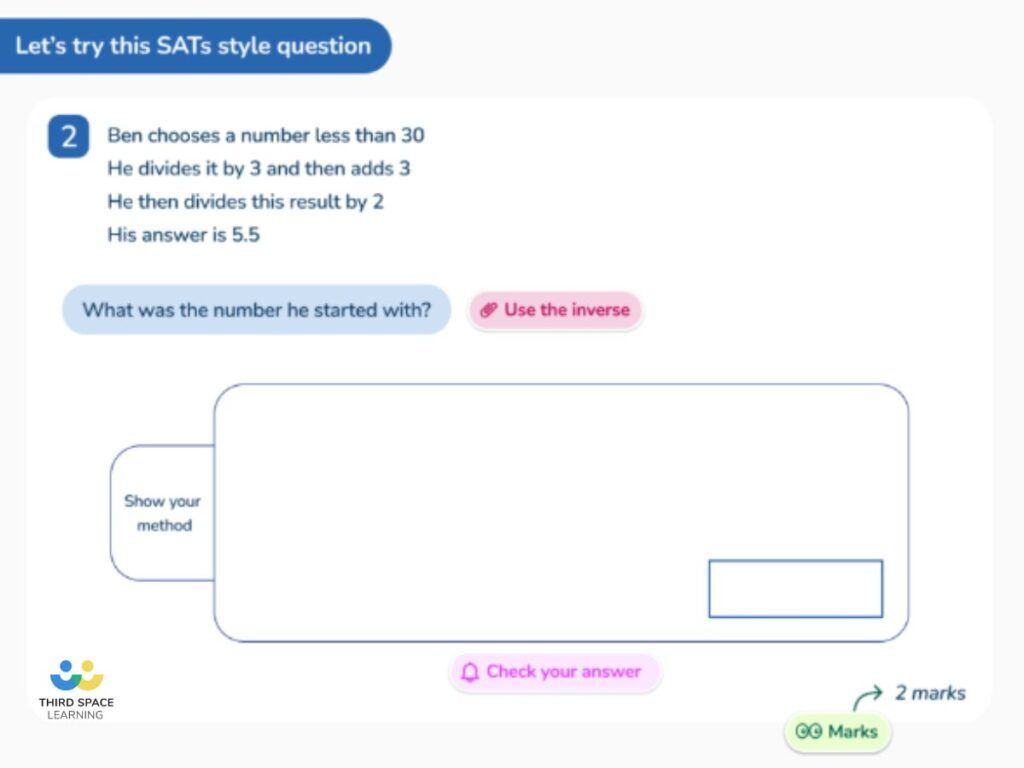
Keep prompting your pupils to be aware of their thought processes in your maths lessons
Tutors are not telling pupils what to do but rather combining explicit input with interactive questioning, pupil decision-making and feedback.
The tutors use this information to help the pupil with metacognitive regulation (planning, monitoring and evaluating) throughout the lesson.
As an example, they remind the pupil about strategies they themselves have highlighted as important in the beginning of the lesson when they get stuck on a question later on.
Questions to use as prompts to elicit metacognition during practice maths tasks
Tutors get tutor notes for each slide (only seen by the tutor) which guides them through this metacognitive process, too. See this information to the left in the image below.
There are three parts which help a pupil articulate their knowledge of themselves, the task and strategies. Namely:
- ‘What do you notice?’
- ‘What do you know?’
- ‘Can you show me your working out?’
Reflection questions are also an important part of the process e.g. ‘Does your answer seem reasonable? Why?’
This maps onto the monitoring and evaluating aspect of regulation strategies.
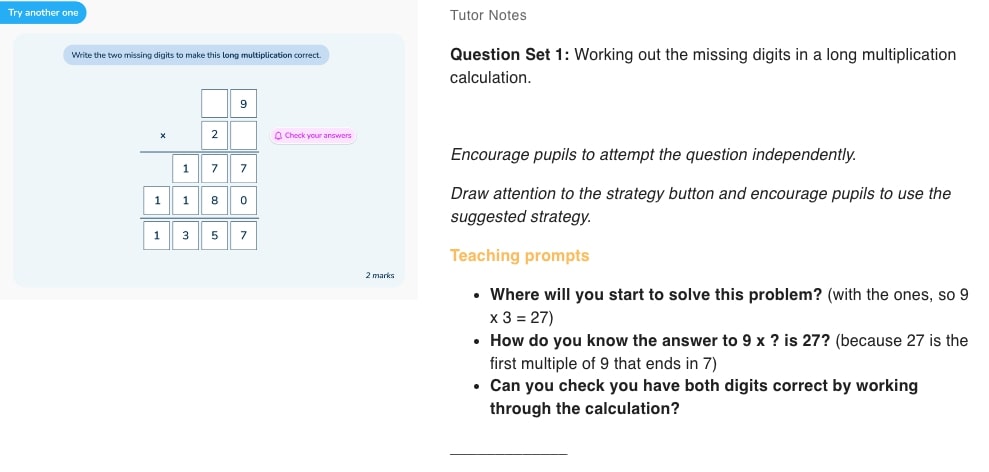
Metacognitive questions to end a maths lesson
In closing, pupils engage in self-reflection by completing their post-session questions on the new knowledge from their session.
Here, the pupil evaluates specific and general progress, skills and strategies which will inform their monitoring and planning for the next time they are working on this topic.
How should teachers teach metacognitive strategies
This is the seven-step model for explicitly teaching metacognitive strategies as recommended by the EEF report:
- Activating prior knowledge;
- Explicit strategy instruction;
- Modelling of learned strategy;
- Memorisation of strategy;
- Guided practice;
- Independent practice;
- Structured reflection.
To see how this works in practice, read our blog on teaching metacognitive skills. We provide practical examples for the primary and secondary classroom using real examples from our online tutoring programmes to help inform your own teaching.
3. MODEL: Model your own thinking to help pupils develop their metacognitive and cognitive processes
The EEF report encourages teachers to model the process as they proceed through a lesson, deliberately moving from a more teacher-led activity to one directed by the student.
Third Space Learning’s one to one maths lessons are broken down into 4 stages to encourage pupils to move from guided practice to independent practice:
- Let’s learn
- Follow me + your turn
- You do
- Go further
Our GCSE and SATs programmes take a slightly different approach as these are revision programmes, however we similarly build in opportunities for scaffolding and independent practice to suit learner needs.
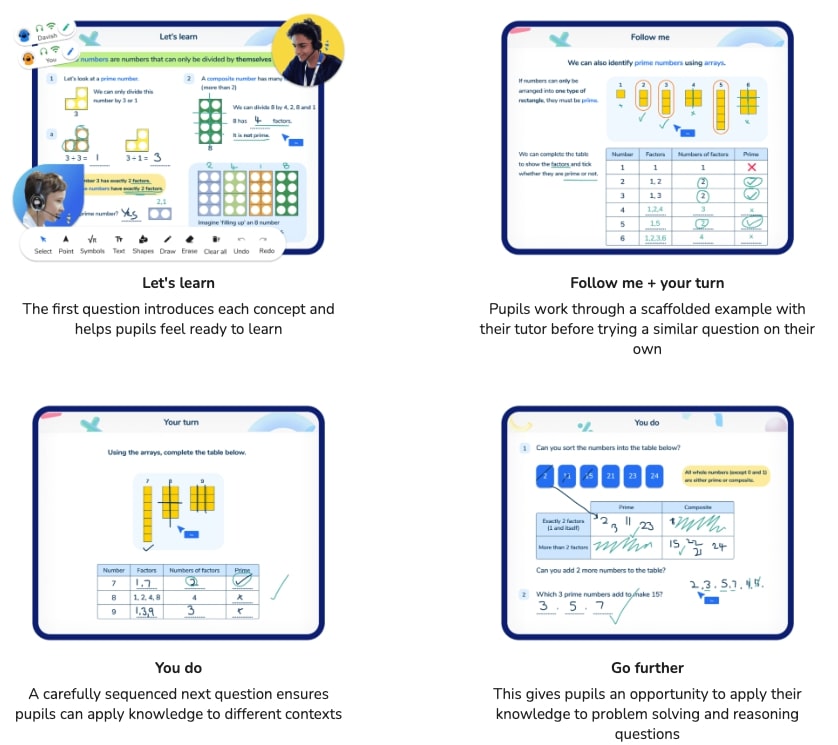
Look at the transition of these slides, as they move from a more scaffolded approach where more modelling occurs towards a less and less scaffolded approach as the pupil starts working more independently.
Could you do this in your maths classroom?
4. CHALLENGE: Set an appropriate level of challenge to develop pupils’ self-regulation and metacognition
The report says:
‘Challenge is key to developing self-regulation and metacognition: if learners are not challenged, they will not develop new and useful strategies; nor will they reflect deeply on the content they are engaging with, or on their learning strategies, or stretch their understanding of themselves. Put simply, and somewhat paradoxically, if pupils have to undertake a task that makes them struggle (remember ‘deliberate difficulties’), they are more likely (in the future) to recall information from such tasks from their long-term memory.’ [21]
Examples of how to keep challenge level up
Our tutors are evaluated each week on one of their maths lessons. ‘Challenge’ and ‘Questioning’ are key components of this evaluation.
Tutors are guided to make sure the pupil is appropriately stretched and challenged according to his/her ability and/or encouraged to develop critical thinking skills.
In our lessons, from KS2 to GCSE, we have explicitly built opportunities for this into our ‘Challenge’ and ‘Go further’ slides.
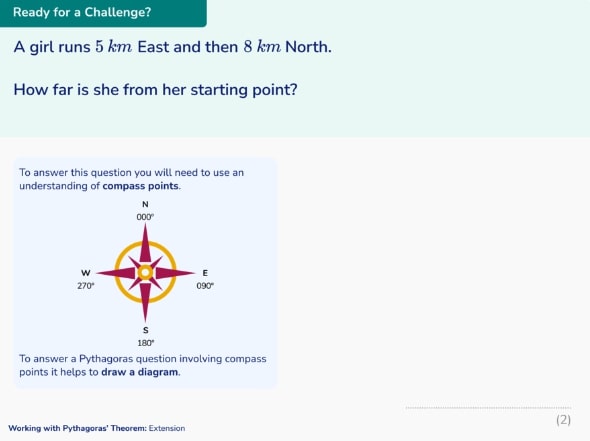
What is an appropriate level of challenge? Looking at John Sweller’s cognitive load theory in the classroom or Vygotsky’s ‘Zone of proximal development’, we see it is important to make it not too hard, not too easy, but just right.
As we teach one to one, our tutors are able to adapt in real time with the correct amount of scaffolding personalised to each pupil.
However, even with a full maths class you will still be an expert at building differentiation in the classroom and adapting the task to each child, whether they are high or low ability students.
5. TALK: Promote and develop metacognitive talk
‘Teachers asking challenging questions—guiding pupils with oral feedback, prompting dialogue, and scaffolding productive ‘exploratory’ talk where appropriate—is an ideal way to share and develop effective learning.’[31]
Tutors leading our maths lessons are encouraged to ask open-ended questions with a focus on reasoning, discussing, arguing and explaining.
Verbal reasoning is one of the first areas teachers notice improvement in with their pupils on Third Space Learning.
‘It’s a fantastic way to get the children TALKING about their maths and explaining their thinking. Children are keen to participate in the sessions and enjoy them.’
Sara Ellis, Deputy Headteacher, Wyke Regis Junior School
Tutors are trained to think about the different purposes of questions posed and we use Bloom’s Taxonomy to help tutors distinguish between them. The ultimate aim is to get to the top layer of cognition (see image below) where a pupil is able to create, evaluate and analyse ideas in a specific topic.
Obviously, it is also important and useful to use aspects of remembering, understanding and applying style questions, in order to build the metacognitive knowledge in this domain to access these higher order skills and reduce pupils cognitive load.

Giving pupils a voice is essential to them being able to construct their own meaning and understanding. Tutor talk time should not dominate the lesson as this restricts pupil voice.
At Third Space Learning, we strongly believe this and we are currently working on assessing word count of audio in real time to warn a tutor if they are speaking too much, so they can adjust accordingly.
Are you and your team vigilant to your balance of pupil and teacher talk in your primary classroom?
6. ORGANISE: Explicitly teach pupils how to organise and effectively manage their learning independently
In order to help pupils achieve self-regulated and independent learning, it is important to support pupils in understanding how to plan, monitor and evaluate their own progress.
Specifically, our tutors encourage pupils to assess and judge their own thinking processes and understanding during the lesson, in the plenary and formally by completing a pupil feedback form at the end of each lesson.
This allows pupils multiple opportunities to improve accuracy in judgement, especially younger ones, as they tend to struggle with having a realistic view of how well they learnt something.In addition, the learning programme has been created to help tutors to best support their pupils with the most effective learning techniques such as retrieval practice, practice testing, distributed (‘spaced’) practice and interleaved practice built in as standard.
7. SUPPORT: Schools should support teachers to develop their knowledge of these approaches and expect them to be applied appropriately
As with any changes to classroom practice and pedagogy, teachers need a lot of support, training, and time to practise in order to implement them effectively.
Every week with Third Space Learning, every tutor has one of their lessons evaluated by an expert and they are then given support in integrating metacognitive and other teaching strategies into their sessions.
Continuous CPD is also delivered and used to help tutors understand how to encourage and support pupils’ metacognition in the specific domain of maths.Make sure that metacognition is on your timetable for discussion each year at your in-school CPD sessions. You’ll be surprised how many teachers will already be using these metacognitive strategies without even perhaps realising it. It’s part of good quality first teaching.
How do we know if our metacognitive strategies in maths are working?
In order to help guide our understanding of self-regulation and metacognition at TSL, we assess our impact by using pupil self reporting questionnaires.
Each programme begins and ends with a ‘Mission Zero’ where we ask cognitive (domain specific), affective (emotional) and metacognitive questions. We cluster pupils into groups and then track which areas they have improved in.
This gives Third Space Learning an idea of which areas we are having the most (or least) impact in and this informs and supports our continuous professional development of tutors and curriculum design.


Never too early to start teaching metacognition
Our tutors mostly work with pupils from KS2 all the way up to GCSE, plugging gaps and fixing common maths misconceptions that have developed over years throughout school.
You can start your own work in your school or classroom today, no matter what year group you teach or are responsible for, in much the same way you might have incorporated a growth mindset in the classroom.
‘Children as young as three have been able to engage in a wide range of metacognitive and self-regulatory behaviours, such as setting themselves goals and checking their understanding. They also show greater accuracy on tasks they have chosen to accept than on tasks they would have preferred to opt out of.
Although older children typically exhibit a broader repertoire of metacognitive abilities, the evidence suggests that younger children do typically develop metacognitive knowledge, even at a very early age.’
EEF (2018)
Now that you’ve got the evidence and some practical strategies that we know work to develop metacognition in the classroom, it’s time to consider what actions you and your schools are going to take…
Read more
- Focused Thinking And Goal Free Questions: How I Wish I’d Taught (Primary) Maths
- Learning and Memory in the Classroom: What Teachers Should Know
- How to Support a Child with Autism in the Classroom
- Effective Praise In The Classroom: What Works & What Doesn’t
- Interleaving: What Is It And How Can It Improve Memory And Learning In The Maths Classroom?
DO YOU HAVE STUDENTS WHO NEED MORE SUPPORT IN MATHS?
Every week Third Space Learning’s maths specialist tutors support thousands of students across hundreds of schools with weekly maths tuition designed to plug gaps and boost progress.
Since 2013 these personalised one to one lessons have helped over 150,000 primary and secondary students become more confident, able mathematicians.
Learn how tutors build rapport or request a personalised quote for your school to speak to us about your school’s needs and how we can help.

